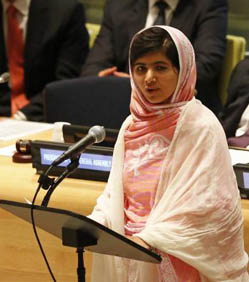
You’ve seen the advertisement on TV in the past few weeks. The two swaddled infants appear lying on a multi-coloured mat. The babies seem contented and comfortable as they lie there. One is cooing; the other has a partial smile. As I looked at the ad, it never occurred to me to ask what gender the infants were. But then we’re told…
“Both of them could be head of a class… could lead a nation,” the voice-over announcer said. “Yet one of them won’t even be given a chance, simply because she’s a girl.”
The sponsors of the ad, Plan Canada “Because I am a girl,” go on to offer a reality check about growing up female in the world today. They point out, in the developing world, for example, that millions of girls are denied basic human rights, such as access to education, freedom to choose their mate, or even the chance to vote on the policies governing where they live.

In effect, Plan Canada says that girls and women are disenfranchised, unequal, not even second-class citizens. Look what Malala Yousafzai endured in 2012 – being shot by the Taliban – simply for speaking out for young women’s rights to go to school in Pakistan.
“They thought that the bullet would silence us,” the Nobel laureate told the United Nations in 2013. “But they failed!”
The coincidental observance of International Women’s Day (IWD), this past week, it seems to me, spotlights an uncomfortable contradiction. Women’s activism has seemingly changed the world, but it hasn’t changed the individual lives of its rank and file. Initially a rallying call, in the early 1900s, for women in Germany, Britain and the United States to support their gender’s fight for “civic rights,” IWD actually drew more than a million women into the streets of major cities in Austria, Denmark, Germany and Switzerland in March 1911. On the anniversary in 1917, IWD demonstrators in Saint Petersburg, Russia, demanded an end to the First World War, an end to food shortages and an end to czarism.
“We did not imagine that this ‘Women’s Day’ would inaugurate the (Russian) Revolution,” Leon Trotsky wrote. Russian women changed their country’s rulers and governance; it’s debatable in the 60 years of soviet communism that followed whether they ever achieved such basics as equal rights or equal pay for work of equal value.

On the 86th anniversary of International Women’s Day, in 1995, I witnessed a remarkable statement of gender equity in Edinburgh, Scotland, when I walked into the streets to buy a newspaper. Founded in 1817, the daily Scotsman proudly proclaimed its “impartiality, firmness and independence.”
In keeping with those strong principles, however, on March 8, 1995, the newspaper had suddenly changed. On the street I encountered female newsies selling the paper, by-lines in the paper that were almost all women reporters, and a uniquely altered, front page logo. The Scotsman for that one day had become The Scotswoman and everybody associated with the paper wore T-shirts displaying the same gender-specific logo.
“This is an incredible day,” I remember the newspaper saleswomen saying. So far as I can tell, such an acknowledgment of the women at the newspaper has never happened again. Like so many initiatives for change, it seemed a great one-day observance, but that’s all that ever became of it.

Last Friday, my boss spoke in an attempt to change such tokenism.
“I’ve been thinking about women’s lives in the world today,” said Ann Buller, the president of Centennial College, at an IWD event.
President Buller reminded students, staff and faculty present about some of those sorry realities young women, not fortunate enough to be born in Canada, face: being married as young as five, being raped because a culture believes such a thing cures a man of AIDS, or being sold to the highest bidder as revenge for a familial slight. As CEO of Centennial since 2004, as well as chair of the board for the Association of Canadian Community Colleges and recipient of such awards as the Queen Elizabeth Diamond Jubilee Medal and the Council for Advancement and Support of Education’s Chief Executive Leadership Award twice, she has shown leadership by example.

“We choose not to ignore, but to engage,” she said as she unveiled an IWD plague remembering the slain women at L’Ecole Polytechnique. “We must not only give voice to those who have been silenced, but we must endeavour to create the conditions where our frail interpretations are replaced by their authentic fray and cry and celebration.”
Particularly when even colleges and universities can discover prejudice and sexual harassment in their midst, President Buller encouraged those of us who teach and learn in Canada to offer leadership until what women and girls need from us is “followership.”
What an extraordinary civilization this might be, were those women at The Scotsman, Malala Yousafzai, and one day that swaddled baby girl to be given their turn to lead.